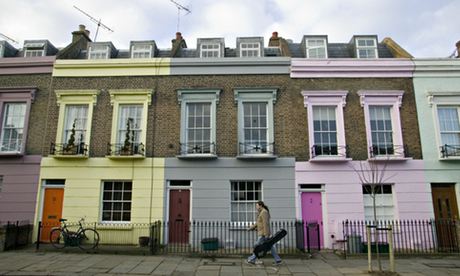House prices in London have increased by almost a fifth over the past 12 months, and are now 20% above their pre-crisis peak, according to the latest data from the country's biggest building society.
In news that will fuel concerns of a price bubble in the capital, Nationwide building society said the average price of a London home had increased by 18% over the year and by 5.3% in the past three months alone, and at £362,699 was now more than twice the figure for the rest of the UK.
"The gap between house prices in London and the rest of the UK is the widest it's ever been, both in cash and percentage terms," said Nationwide's chief economist, Robert Gardner.
"Overall, the southern regions have been outperforming for some time, with the result that house prices in London, the outer metropolitan and outer south-east have now surpassed their pre-crisis peaks."
In the north London borough of Brent, Nationwide's figures showed prices rose by almost a third in one year, to £465,502. Since early 2013, only Harrow has not recorded double-digit price increases.
Estate agents and homebuyers have reported frenzied demand for property in the capital, with homes attracting huge numbers of would-be buyers.
Peter Rollings, head of London agents Marsh & Parsons, said there had been unprecedented levels of demand and record sales, with 48 potential buyers registered for each available property in south-west London.
"A two-bedroom, ground-floor flat in Balham, initially advertised at £450,000, recently attracted 107 viewings and 53 offers. It eventually sold for £549,000," he said.
Nationwide's index showed big price increases elsewhere, including the city of Manchester, where prices were up by 18% year-on-year, to £211,748, but across the north of England prices remained below the 2007 peak.
The society reported a slight slowing in price growth in March, saying the average cost of a UK home had risen by 0.4%, to £180,264, the smallest monthly increase since June 2013.
However, the annual rate of price inflation continued to increase, and across the country homes are selling for 9.2% more than a year ago.
The figures, which are based on mortgages approved by the society and adjusted to reflect the cost of a "typical home", show that the recovery in the housing market has spread beyond the south-east, with all 13 regions of the UK recording growth of more than 5% between the first quarter of 2013 and the same period of 2014.
However, the south-east saw the biggest jump, with prices in London's commuter belt rising by 10.6% to an average of £273,998, and the rest of the south-east also recording double-digit growth of 10.1% to an average of £217,534.
Increases were more muted in the rest of the UK, with Wales recording the lowest annual growth of 5.2%.
"Record low mortgage rates, improved availability of credit and the brighter economic outlook are all leading to increased demand for housing," Gardner said.
"However, the upturn in the supply side of the market continues to lag far behind, with the number of new homes being built in England still around 40% below pre-crisis levels, and this was already insufficient to keep up with the increase in the number of households being formed."
The figures came the day after the first anniversary of the launch of the government's Help to Buy loan scheme, which offers homebuyers an interest-free loan of up to 20% of the value of a newbuild property costing up to £600,000.
In the first 11 months of the scheme 16,465 purchases were completed, and the government has estimated that at least a quarter of these properties would not have been bought, or built, without the scheme.
However, supply of property remains low, with just 109,370 homes completed in 2013, far short of the 250,000 some experts say are needed to meet demand.
The second part of the scheme, which offers a taxpayer-backed guarantee to lenders with 95% mortgages on existing properties, has been criticised for boosting demand without encouraging building.
Rising house prices across the UK, driven by the improving economy and government measures to make mortgages more easily available to buyers with small deposits, have led to calls from some quarters for the Bank of England to take action to stop the market overheating.
Howard Archer, chief UK economist at IHS Global Insight, said policymakers needed to keep a very close watch on how the housing market develops over the coming months and to be "fully prepared" to act.
"Once strong upward momentum has developed in the housing market, it can be hard to stop – especially if interest rates are unlikely to rise markedly," he said.
"We believe the bank will take further action later this year to try to dampen the housing market having already ended Funding for Lending Support for mortgage lending.
"This could very well include the Bank of England recommending to the government that it dilutes the Help to Buy mortgage guarantee scheme. In particular, the £600,000 price limit for a house under the scheme could be cut, perhaps to £300,000."
One of the Bank's key powers beyond making changes to Help to Buy is putting restrictions on mortgage lending, however it could struggle to limit price growth, as around 40% of purchases are believed to be made in cash.


